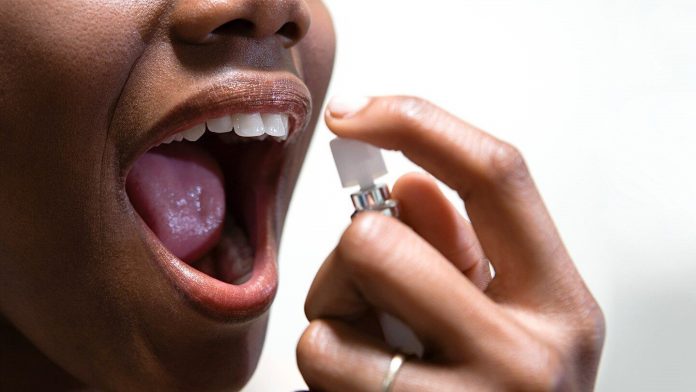It could happen to anyone–you’re finally alone with the man of your dreams, for instance, and suddenly, as you both get closer, you seem him less as a knight in shining armor than something the knight’s horse dropped. Or your old Granny Agnes may try to give you a kiss and tweak your cheek, and you suddenly don’t care if you’re left out of the will, you just run outside for some of that relatively-speaking cleaner LA air. The causes may be different in each case but the end result is that bad breath, or halitosis to make it sound less noxious, can wilt all life forms within the reach of the perpetrator’s range. If your dog wants to roll on you every time you open your mouth, it’s time to do something about it.
First, what causes halitosis? The causes can range from something you ate or drank such as garlic, coffee, or liver, to tobacco use, periodontal (gum) disease, tooth decay, sinus infection, or a variety of other health conditions such as liver disease, diabetes, and respiratory infections. The primary reason, however, is bacteria that have collected in the mouth, on the tongue, gums, and between teeth. Poor dental hygiene–infrequent tooth-brushing, failure to floss, and not brushing the tongue (which few people do) is a prime source behind this common problem. Dry mouth conditions (xerostomia) can also increase bad breath, since saliva is necessary to rinse the mouth. This is common after a night of drinking, as those with hangovers often experience.
In most cases, as we are led to believe by commercials for breath mints, lozenges, sprays and mouthwash, all we need to do is mask the odor and we’re good to go. That’s the equivalent of putting a tarp over quicksand. It may disguise it but it doesn’t solve the problem. Mouthwash, which contains alcohol, may kill most germs but isn’t really sufficient. Again, it covers up the evidence of bad breath but doesn’t eliminate the source.
What anyone can do for starters is take good care of your mouth. Brushing your teeth after meals, flossing, and brushing or scraping the tongue gently go far to ensure not only good dental health but helps rid the mouth of bacteria. Regular dental checkups can also discover if there is any gum disease that needs treatment as this is a situation where bacteria often are trapped and breeding, causing odor as well as pain. Many dentists recommend rinsing the mouth out every night with salt water. Soaking dental appliances or dentures in a baking soda and water solution also helps keep these devices in clean condition.
Using cinnamon (which has antibacterial qualities), mint or parsley, both of which are abundant in chlorophyll, a natural odor neutralizer, are efficient, natural methods of clearing your breath rather than only replacing one smell with another, albeit less offensive. Avoidance of foods and drinks that will cause lingering undesirable scents is also important. As for those taking garlic for their medicinal qualities, please note: you can get odorless garlic pills in health stores.
If you have a simple, bacteria-based breath problem, following these steps can help immensely. However, if the source is dental you will also avoid a multitude of other, more serious and very much more expensive, woes by having your dentist involved. In the event your breath odor is the result of other health problems, you owe it to yourself to get this checked out. Halitosis could end up being really a symptom of illness rather than merely a social dilemma.








